Here are some photographs from the workshop performances of my new opera with composer Stella Sung (I am the librettist, which means that I created the characters, story, settings, and wrote the words for the singers). Please note that this is a workshop production, performed in a limited manner for the benefit of the composer, librettist, conductor, and director in preparation for the full-scale 2014 performances at the Phillips Center for the Performing Arts at the University of Florida, which will feature professional singers, a full orchestra, and more advanced and immersive stagecraft. Click on any of the photographs in order to enlarge.

Ernest Hilbert, Stella Sung, and director Robert Swedberg conduct the panel “Collaborative Process of Composing, Designing, and Producing The Red Silk Thread” before the Friday evening performance. Also on stage is Dr. Peter Marsh, who delivered his lecture “This Is Our Tradition: The Transformative Roles of Traditional Music in Post-Socialist Mongolia” the night before. Urtaa Gantugla performs examples of traditional Mongolian music on the horsehead fiddle, properly known as the morin khurr.
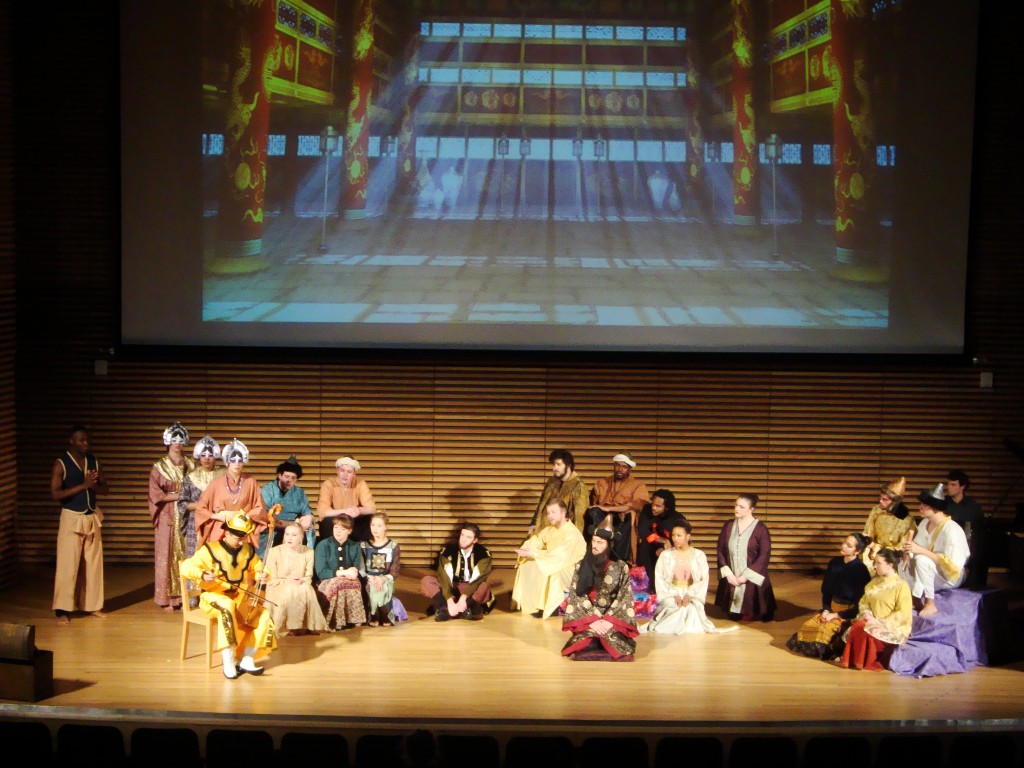
My libretto called for a “musical interlude” during a tense sequence of exchanges in the Court of Kublai Khan. The Confucius Institute paid for a traditional Mongolian morin khurr (horsehead fiddle) player (Urtaa Gantulga, in bright yellow, to the left of the image) to be flown in for these performances.
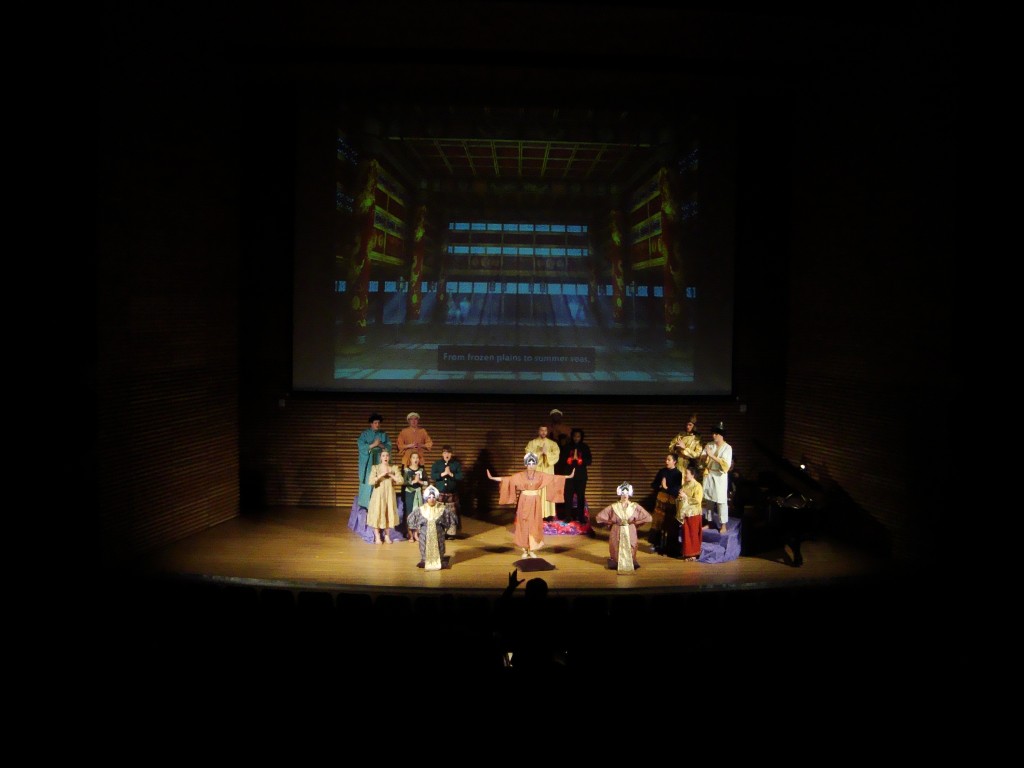
Khan’s consorts sing their trio “Our Empires Will Find Peace”: Empress Nambui, the eldest (soprano), Empress Tegulen, the middle (mezzo soprano), Empress Chabi, the youngest (alto)
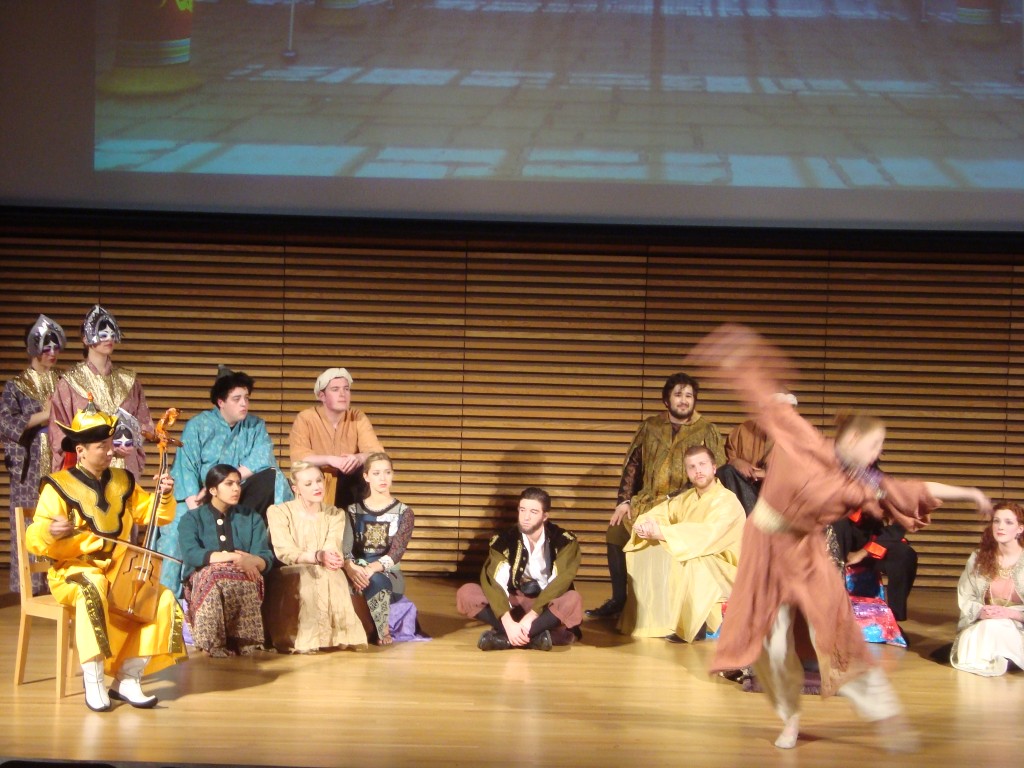
One of Khan’s three consorts is inspired to dance by the rustic music of the Mongolian plains of her youth.
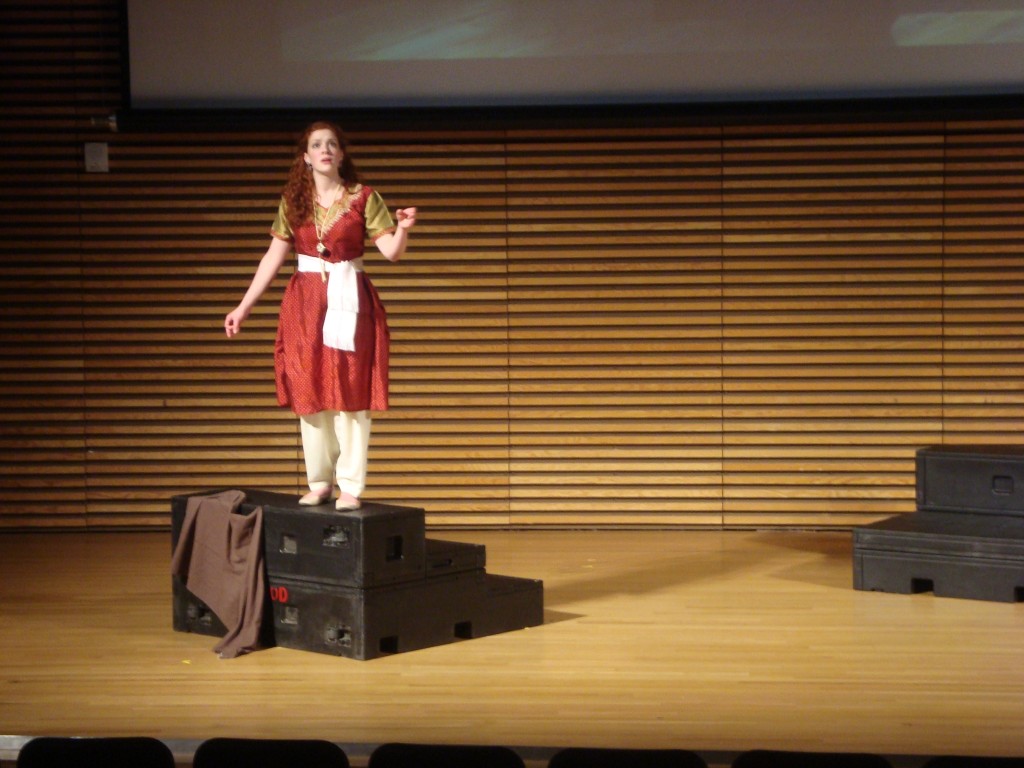
Princess Cocachin sings her “Queen Moon” aria and contemplates suicide on the ship’s deck in Act II.

Khan’s Imperial Junk is boarded by daring Wokou, Japanese pirates, wielding deadly Bo Staffs against the Chinese and Venetian forces armed with swords.
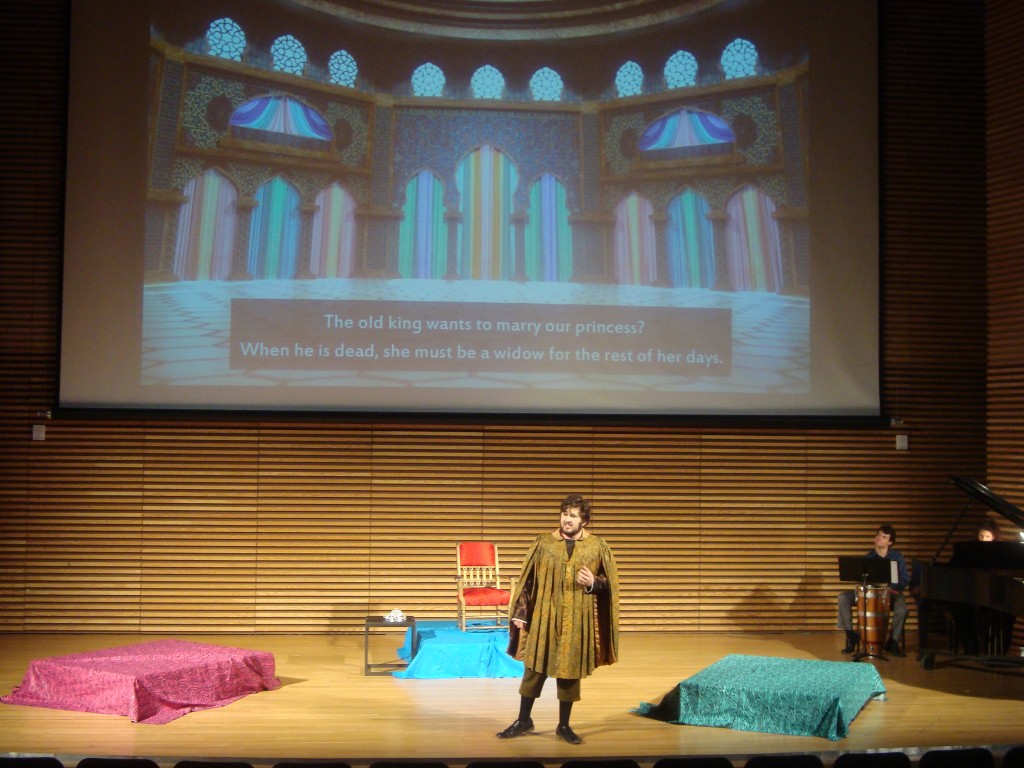
An enormously charming Uncle Maffeo hams it up in the abandoned Persian court of King Takesh the Magnificent, performing his showstopping and heartbreaking “If I Were a King” aria.
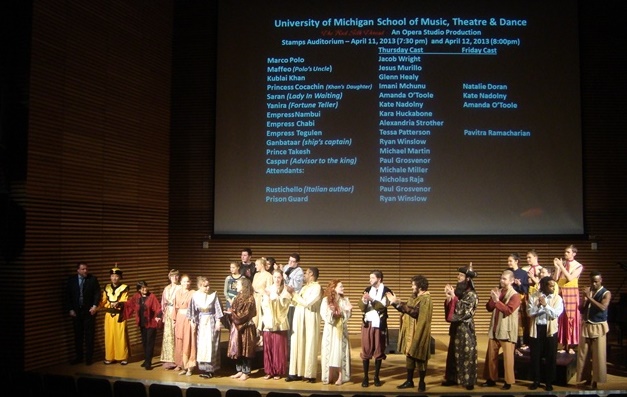
The cast takes the stage for a standing ovation, with the rather awkward and startled librettist in a suit on the left of the image.
Here is one of the sets, for Act I, in the court of Kublai Khan, as it will appear in 2014 at the Philips Center for the Performing Arts in Florida, for the 2014 full-scale performances.
The Red Silk Thread, an exhilarating new opera from composer Stella Sung and librettist Ernest Hilbert, invites audiences to visit an era of regal splendor, dangerous promises, and astonishing turns of fate!
Travel to the legendary court of the Great Kublai Khan . . .
Experience fierce pirate battles on imperial Chinese junks . . .
Witness betrayal and intrigue in the corrupt court of the Persian king . . .
Journey with the daring Italian traveler Marco Polo and the irresistible young Chinese Princess Cocachin to an age when jealousy, war, and ancient loyalties vie with love and destiny to tell an epic tale you will never forget.
* * *
Dramatis Personae
The Venetians
Marco Polo, Venetian merchant traveller, ambassador of the Court of the Khan (tenor)
Maffeo, Marco’s uncle (baritone)
Rustichello da Pisa, author of romances, cellmate of Marco Polo in Genoa (baritone)
The Mongols, Yuan Dynasty
Kublai Khan, ruler of China and Mongol Empire, grandson of Genghis Khan (bass)
Princess Cocachin, seventeen-year-old beauty (soprano)
Khan’s Consorts:
Empress Nambui, the eldest (soprano)
Empress Tegulen, the middle (mezzo soprano or alto)
Empress Chabi, the youngest (soprano)
Saran, Lady-in-Waiting to Princess Cocachin (mezzo soprano)
Yanira, court astrologer (alto)
Ganbaatar, ship’s captain (baritone)
Ladies and Sentries, Barons and Generals (SATB)
Sailors and Soldiers (tenors and basses)
The Persians, Khwārazm-Shāh Dynasty
Prince Takesh the Brave (tenor)
Caspar, advisor to King Takesh The Magnificent (baritone)
Rostam, King Takesh’s greatest warrior (non-singing part)
Ladies, Attendants, and Warriors (SATB)
Wokou, Japanese Pirates
Genoese Prison Guard (baritone)
* * *
Act I
The famous Venetian world traveler Marco Polo returns from a diplomatic journey to the court of his patron, the Great Kublai Khan. A lavish celebration is underway. Khan’s daughter, the beautiful young Princess Cocachin, has been promised in marriage to the cruel King Takesh of Persia in order to quell the threat of looming war and reopen the profitable but oftentimes dangerous trade route from Persia to China. Marco Polo and the unhappy teenaged princess find themselves mysteriously drawn to each other. The princess’s lady-in-waiting, Saran, senses trouble and vows to keep the two apart until they leave for Persia. During the celebration, the superstitious Khan’s favorite soothsayer delivers a worrying prophecy about the princess’s future, but the emperor, in a contented mood, chooses to dismiss it. During a secret rendezvous the next day in the palace garden, Marco and the princess come to realize that their forbidden love is hazardous not only to themselves but to the future of Great Khan’s empire. Marco Polo pledges to set off at once on a new journey and forget the princess forever, but he is waylaid by the emperor, who announces he has chosen Marco Polo, the only man he truly trusts, to escort the princess across perilous seas and deserts to the court of the dreaded King of Persia. . . .
Act II
Marco Polo commands a fleet of Imperial War junks carrying the princess to Persia. She has chosen to remain below deck during the passage. A captain warns of the threat of Wokou, ravenous Japanese pirates, but Marco Polo, preoccupied with thoughts of the princess, chooses to ignore the warning as his fleet approaches a narrow strait where they will be vulnerable to attack. That night, by the light of a full moon, Marco Polo restlessly paces the decks alone. Princess Cocachin, also believing she is alone, emerges from her cabin to sing to the moon. They meet and wonder why they cannot be together. The princess gives Marco Polo a cloth into which she has woven a red silk thread, promising that, according to a proverb, whatever happens, the invisible “red thread of fate” will always connect them. They are surprised by Saran, who sends the princess back to her cabin. Saran tells the sad story of her own youthful love gone dreadfully wrong. She explains again why the two must remain apart. After she leaves, Marco Polo sings his own plaintive song to the moon, wondering who he really is after all these years. Before he can finish, alarms are sounded as Wokou swarm the junk. Marco Polo leaps into a ferocious sword battle with the pirates. He must decide if he will risk his life against impossible odds to rescue the princess as pirates carry her back to their ship . . . .
Act III
Marco Polo’s uncle Maffeo arrives early in the Persian court only to find it empty. He imagines himself a king for a day. He begins to suspect that something is amiss after happening upon the Persian King’s attendant Caspar, who is frantically concerned about the impending marriage. When Marco Polo and the princess arrive, it is obvious to all that they have grown dangerously close. They are introduced to King Takesh’s dashing and charismatic son Prince Takesh, who charms the delegation, including the princess. Princess Cocachin trembles at the thought of the impending wedding but sudden news arrives that the old King Takesh has died before the ceremony could begin. Marco Polo rejoices only to discover that the wedding will proceed with Prince Takesh, who will become the new king and bring peace to the warring kingdoms. Marco Polo, jealous and protective, draws his sword on Prince Takesh and the two prepare to duel. Princess Cocachin assumes control over her life for the first time, separating the men and explaining to Marco Polo that their love could never be and that she has decided to fulfill her destiny by marrying the prince and becoming a queen.
In the final scene, Marco Polo finds himself a prisoner-of-war in a Genoese prison cell with a writer named Rustichello, to whom he relates his wondrous travels, leaving out only the story of his lost love for the princess. Upon being freed from captivity, Marco Polo is given a letter from the Persian Court announcing that the princess has been poisoned. The most painful memory rushes back and Marco Polo finds himself transported to a desert, where he encounters a vision of the princess. Still connected by the red thread, they sing to each other one last time.

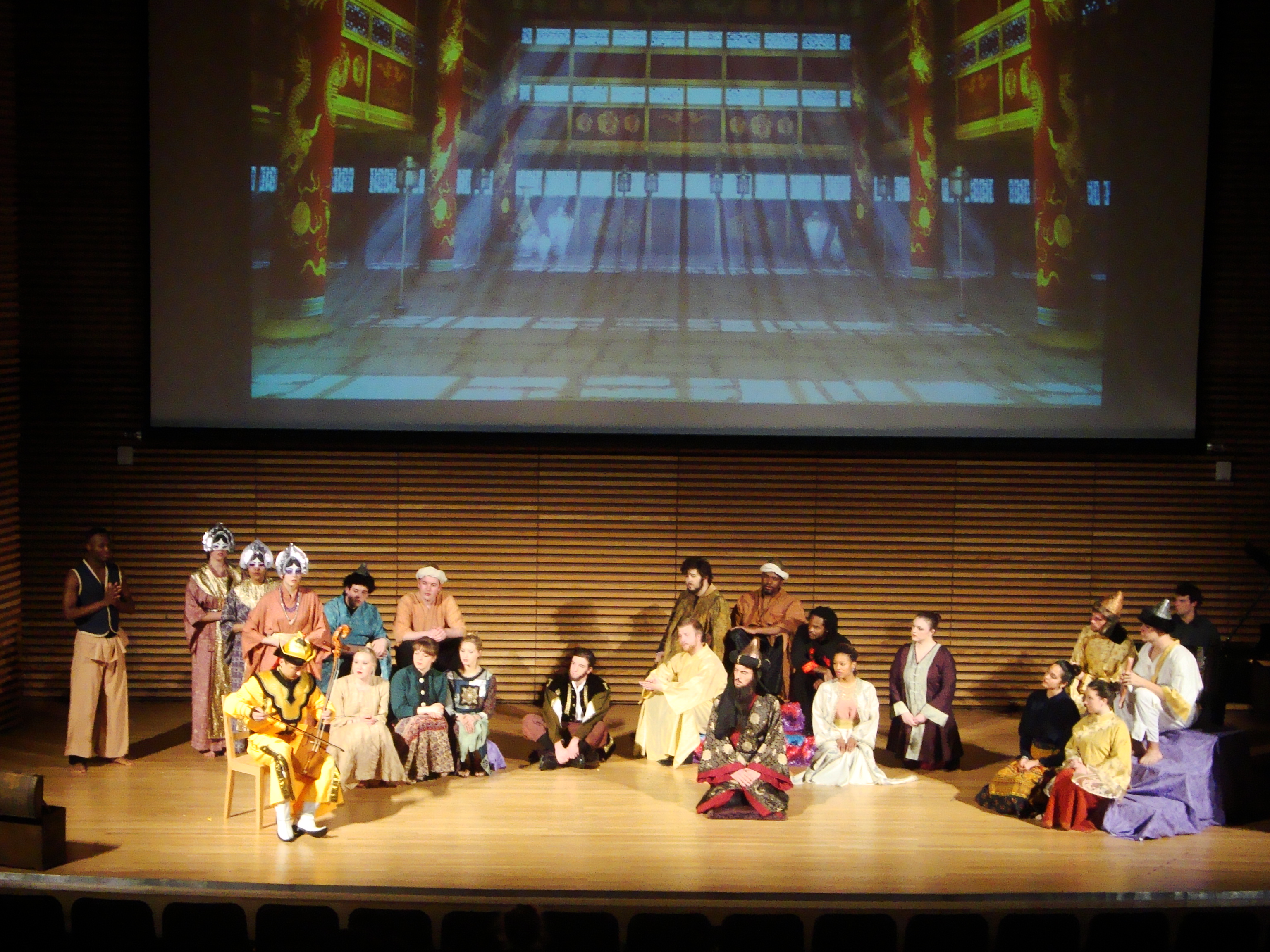
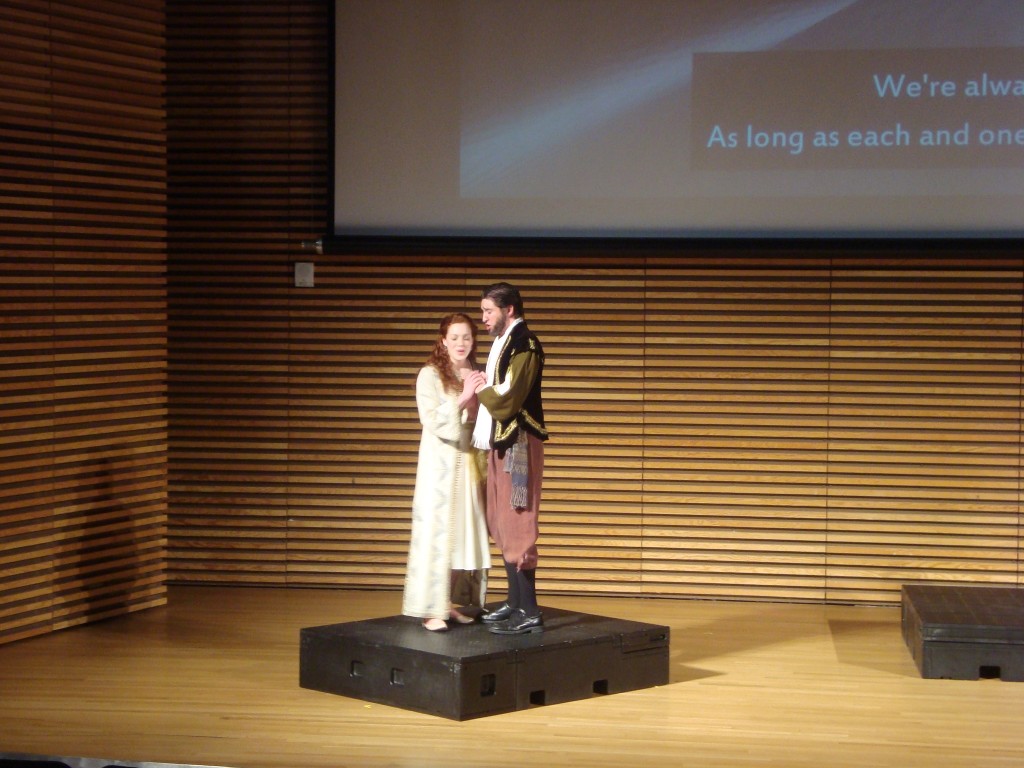


1 Comment
Hi Ernie! This is great! Thanks for posting this, and I hope that your fans and friends will come and join us next April 17, 19th at the University of FL for the performances!